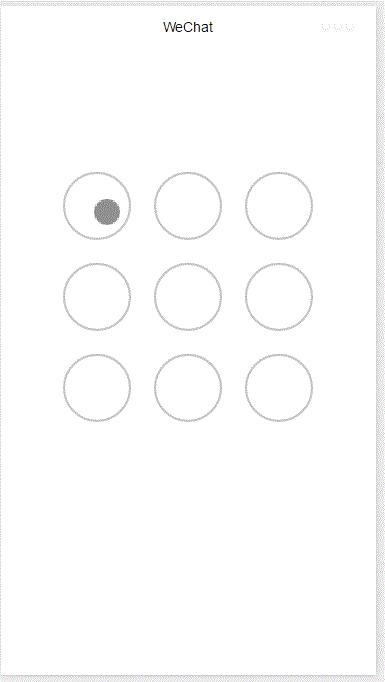微信小程序开发之手势解锁的介绍
时间:2024/2/12作者:未知来源:手揣网教程人气:
- [摘要]手势解锁是app上常见的解锁方式,相比输入密码方式操作起来要方便许多。这篇文章主要介绍了微信小程序开发教程-手势解锁实例,有兴趣的可以了解一下。手势解锁是app上常见的解锁方式,相比输入密码方式操作...手势解锁是app上常见的解锁方式,相比输入密码方式操作起来要方便许多。这篇文章主要介绍了微信小程序开发教程-手势解锁实例,有兴趣的可以了解一下。
手势解锁是app上常见的解锁方式,相比输入密码方式操作起来要方便许多。下面展示如何基于微信小程序实现手机解锁。最终实现效果如下图:

整个功能基于canvas实现,首先添加画布组件,并设定样式
<!--index.wxml--> <view class="container"> <canvas canvas-id="id-gesture-lock" class="gesture-lock" bindtouchstart="onTouchStart" bindtouchmove="onTouchMove" bindtouchend="onTouchEnd"></canvas> </view>
.gesture-lock { margin: 100rpx auto; width: 300px; height: 300px; background-color: #ffffff; }手势解锁实现代码在gesture_lock.js中(完整源码地址见末尾)。
初始化
constructor(canvasid, context, cb, opt){ this.touchPoints = []; this.checkPoints = []; this.canvasid = canvasid; this.ctx = context; this.width = opt && opt.width 300; //画布长度 this.height = opt && opt.height 300; //画布宽度 this.cycleNum = opt && opt.cycleNum 3; this.radius = 0; //触摸点半径 this.isParamOk = false; this.marge = this.margeCircle = 25; //触摸点及触摸点和画布边界间隔 this.initColor = opt && opt.initColor '#C5C5C3'; this.checkColor = opt && opt.checkColor '#5AA9EC'; this.errorColor = opt && opt.errorColor '#e19984'; this.touchState = "unTouch"; this.checkParam(); this.lastCheckPoint = null; if (this.isParamOk) { // 计算触摸点的半径长度 this.radius = (this.width - this.marge * 2 - (this.margeCircle * (this.cycleNum - 1))) / (this.cycleNum * 2) this.radius = Math.floor(this.radius); // 计算每个触摸点的圆心位置 this.calCircleParams(); } this.onEnd = cb; //滑动手势结束时的回调函数 }主要设置一些参数,如canvas的长宽,canvas的context,手势锁的个数(3乘3, 4乘4),手势锁的颜色,手势滑动结束时的回调函数等。并计算出手势锁的半径。
计算每个手势锁的圆心位置
calCircleParams() { let n = this.cycleNum; let count = 0; for (let i = 0; i < n; i++) { for (let j = 0; j < n; j++){ count++; let touchPoint = { x: this.marge + i * (this.radius * 2 + this.margeCircle) + this.radius, y: this.marge + j * (this.radius * 2 + this.margeCircle) + this.radius, index: count, check: "uncheck", } this.touchPoints.push(touchPoint) } } }绘制手势锁
for (let i = 0; i < this.touchPoints.length; i++){ this.drawCircle(this.touchPoints[i].x, this.touchPoints[i].y, this.radius, this.initColor) } this.ctx.draw(true);接下来就是识别用户的滑动行为,判断用户划过了哪些圆圈,进而识别出用户的手势。
在touchstart和touchmove事件中检测触发并更新画布
onTouchStart(e) { // 不识别多点触控 if (e.touches.length > 1){ this.touchState = "unTouch"; return; } this.touchState = "startTouch"; this.checkTouch(e); let point = {x:e.touches[0].x, y:e.touches[0].y}; this.drawCanvas(this.checkColor, point); } onTouchMove(e) { if (e.touchState === "unTouch") { return; } if (e.touches.length > 1){ this.touchState = "unTouch"; return; } this.checkTouch(e); let point = {x:e.touches[0].x, y:e.touches[0].y}; this.drawCanvas(this.checkColor, point); }检测用户是否划过某个圆圈
checkTouch(e) { for (let i = 0; i < this.touchPoints.length; i++){ let point = this.touchPoints[i]; if (isPointInCycle(e.touches[0].x, e.touches[0].y, point.x, point.y, this.radius)) { if (point.check === 'uncheck') { this.checkPoints.push(point); this.lastCheckPoint = point; } point.check = "check" return; } } }更新画布
drawCanvas(color, point) { //每次更新之前先清空画布 this.ctx.clearRect(0, 0, this.width, this.height); //使用不同颜色和形式绘制已触发和未触发的锁 for (let i = 0; i < this.touchPoints.length; i++){ let point = this.touchPoints[i]; if (point.check === "check") { this.drawCircle(point.x, point.y, this.radius, color); this.drawCircleCentre(point.x, point.y, color); } else { this.drawCircle(this.touchPoints[i].x, this.touchPoints[i].y, this.radius, this.initColor) } } //绘制已识别锁之间的线段 if (this.checkPoints.length > 1) { let lastPoint = this.checkPoints[0]; for (let i = 1; i < this.checkPoints.length; i++) { this.drawLine(lastPoint, this.checkPoints[i], color); lastPoint = this.checkPoints[i]; } } //绘制最后一个识别锁和当前触摸点之间的线段 if (this.lastCheckPoint && point) { this.drawLine(this.lastCheckPoint, point, color); } this.ctx.draw(true); }当用户滑动结束时调用回调函数并传递识别出的手势
onTouchEnd(e) { typeof this.onEnd === 'function' && this.onEnd(this.checkPoints, false); } onTouchCancel(e) { typeof this.onEnd === 'function' && this.onEnd(this.checkPoints, true); }重置和显示手势错误
gestureError() { this.drawCanvas(this.errorColor) } reset() { for (let i = 0; i < this.touchPoints.length; i++) { this.touchPoints[i].check = 'uncheck'; } this.checkPoints = []; this.lastCheckPoint = null; this.drawCanvas(this.initColor); }如何调用
在onload方法中创建lock对象并在用户触摸事件中调用相应方法
onLoad: function () { var s = this; this.lock = new Lock("id-gesture-lock", wx.createCanvasContext("id-gesture-lock"), function(checkPoints, isCancel) { console.log('over'); s.lock.gestureError(); setTimeout(function() { s.lock.reset(); }, 1000); }, {width:300, height:300}) this.lock.drawGestureLock(); console.log('onLoad') var that = this //调用应用实例的方法获取全局数据 app.getUserInfo(function(userInfo){ //更新数据 that.setData({ userInfo:userInfo }) that.update() }) }, onTouchStart: function (e) { this.lock.onTouchStart(e); }, onTouchMove: function (e) { this.lock.onTouchMove(e); }, onTouchEnd: function (e) { this.lock.onTouchEnd(e); }以上就是本文的全部内容,希望对大家的学习有所帮助,更多相关内容请关注PHP中文网!
相关推荐:
微信小程序之小豆瓣图书的介绍
微信小程序列表的上拉加载和下拉刷新的实现
以上就是微信小程序开发之手势解锁的介绍的详细内容,更多请关注php中文网其它相关文章!
小程序是一种不需要下载安装即可使用的应用,它实现了应用“触手可及”的梦想,用户扫一扫或者搜一下即可打开应用。
关键词:微信小程序开发之手势解锁的介绍